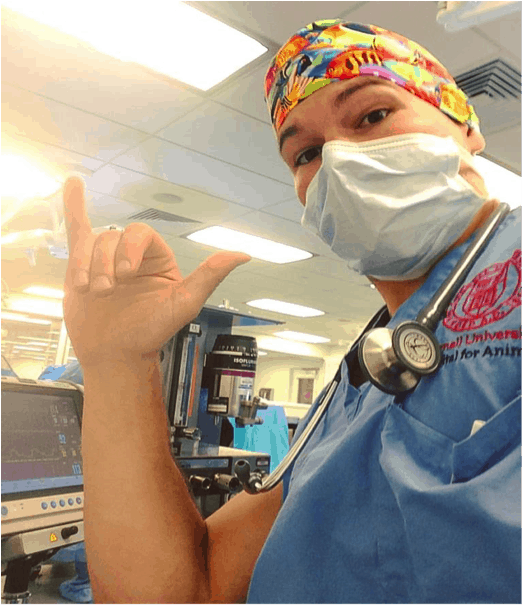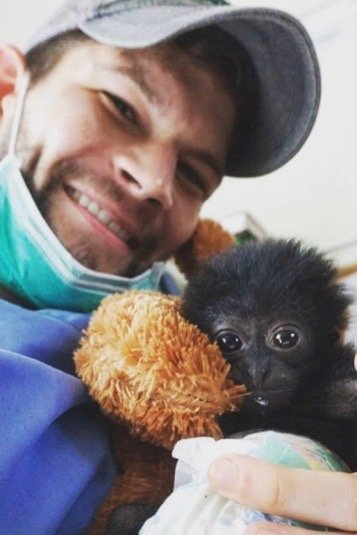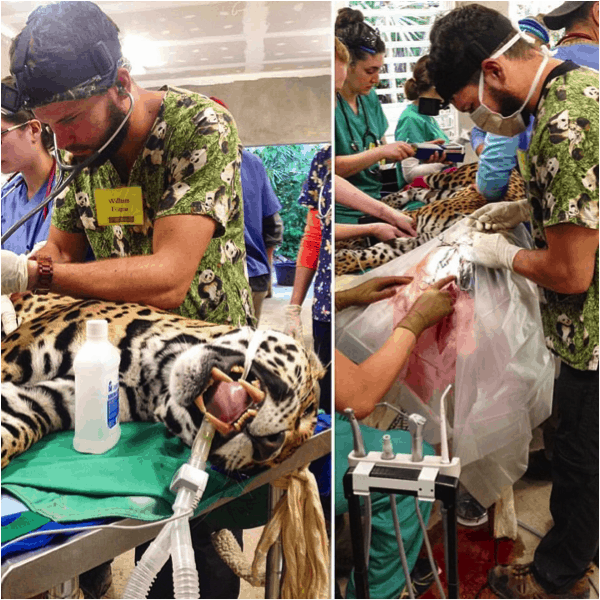Where is Cornell Vet Located?
Today we are featuring an interview with William from Cornell veterinary school. People do often ask where Cornell vet school is located? To answer that question first Cornell vet is located in the awesome town of Ithica, NY.
Cornell is one of two vet schools in New York. William is primarily interested in becoming a wildlife veterinarian with a focus on One Health. Some students might even consider Cornell a wildlife vet school.
Where is Cornell Veterinary School Located?
Cornell veterinary school is located in the state of New York. The town of Ithica where Cornell veterinary is located is about a 4-hour drive from New York City. Upstate NY is a heavily wooded area so it makes sense that they have a wildlife specialty on campus.
Veterinary Medicine is the only profession that operates at the interface of the three disciplines that make up One Health. The main goal of the One Health approach is to attain optimal health for people, animals, and the environment.
Find out what criteria William had in order to get into Cornell University College of Veterinary Medicine and become a Cornell vet student!
The Cornell vet school acceptance rate differs each year. According to the AVMA website in 2019 they had 1,147 applicants, and 120 accepted students.
- Association of American Veterinary Medical Colleges (AAVMC) (Author)
- English (Publication Language)
- 274 Pages - 04/15/2020 (Publication Date) - Purdue University Press (Publisher)
*Note to reader: there might be affiliate links and if you buy Magoosh or anything else through the links provided (at no extra cost to you) you will be helping to keep this site running.*
Name, veterinary school attended, and year that you started.
William Fugina, Cornell University College of Veterinary Medicine, 2015

Where did you attend undergrad and what was your major?
SUNY Geneseo, NY. Majored Bachelor’s of Science in Biology
At what age did you first apply to Cornell College of Veterinary Medicine?
22
How many schools/application cycles did you apply to before being accepted to Cornell vet college?
I applied to 8 schools, one application cycle, was denied from one school, and accepted for interviews from the rest of the schools. Learn about how many vet schools other students applied to here.
Were you waitlisted at any school?
No
How many schools invited you for an interview?
6
How many of those gave you an acceptance letter?
4, the rest I canceled my interviews because I had been accepted to Cornell vet college and committed to there.

Do you remember any specifically challenging interview questions?
Mississippi vet school proposed a theoretical disease outbreak and asked what I would do as a veterinarian. Others asked questions such as what was my life’s biggest regret, what was a situation I have been in that challenged my moral compass.
What was your GPA (in undergraduate)?
3.83
What was your GRE score?
Two-part: 310
Improve your GRE score by at least 5 points. Learn it the easy way with Magoosh GRE test prep
Did you attend grad school?
No
What kind of animal experience did you have prior to applying to Cornell vet college?
Mostly large animal production (dairy) and small animal (local vet clinics). Some exposure to wildlife and exotics.
How many extracurricular activities did you list on your VMCAS application?
I did a lot of extracurricular activities, mostly school club related and sports.
What types of paying jobs did you have before getting into Cornell vet college?
Camp counselor, a variety of restaurant positions, landscaping, and a veterinary assistant.
Did you volunteer? If so, where?
Volunteered at a local dairy farm (about 13,000 cows) for a summer at SUNY Geneseo with a dairy veterinarian. I also volunteered at several small animal veterinary clinics throughout my undergraduate.
How many people read your personal statement before submitting it?
Three
When did you decide to become a vet?
At the commencement of my undergraduate, I fully committed but it was always something I considered since high school.
How did you get into wildlife medicine? Do you plan on making a career out of it after graduation?
Cornell has a lot of opportunities for wildlife medicine exposure and some might consider it a wildlife vet school. I work as a student technician at our local wildlife clinic. This is when I fell in love with wildlife.
I have also worked at the Belize Zoo through Cornell vet college and have been conducting wildlife research in Indonesia for two months. I absolutely plan to make a career out of wildlife veterinary medicine and One Health. Specifically, public health, conservation, and One Health is my major focus.

Did you interview any vets before starting the application process?
No, I did not.
Were you a member of any clubs at your undergraduate school? If so, which ones?
Yes, biology club, Men’s rugby, pre-veterinary club, swing dance club, Relay for Life. I was also a Teacher Assistant for General Biology Courses and for Vertebrate Biology upper-level course.
Did you join student clubs at Cornell Veterinary school? If so, which ones? Were they helpful?
Yes, I was an officer of our student government (SCAVMA), fraternity (OTS), Zoo and Wildlife Society, TBC-GSA (graduate school conservation biology club). I am also a part of the pathology club, surgery club, and Intramural Sports. Jobs: Pharmacy Technician, Wildlife Technician, Student Milker at our Dairy Barn, Wildlife Diagnostic technician at Cornell Animal Health Diagnostic Center.
Did you apply for vet school after, or during your Bachelor’s education?
During
Who gave you your letters of recommendation? Did you know them well?
I can’t emphasize the importance of this enough. Get letters of recommendation from people who really know you. I had two veterinarians and two professors (Organic Chemistry and Vertebrate Biology) whom I remained close with since I left undergraduate. Befriend your professors and the vets you work with. Make a good impression everywhere you go.
Did you find the application process stressful? Why or why not?
Don’t do what I did and wait for the semester to start to get the bulk of your application done. When it opens in June, complete as much of the application as you can before the semester. Take the GRE early, and get your letters of recommendation and transcripts in well before the deadline. Also, start to chug away on your personal statement and supplemental applications too.
Are you happy that you chose this career? What makes you most happy about this career choice?
The more I promote my profession and learn from my mentors the more proud and excited I get for this profession. What makes me most happy about this profession is that you get to work with some of the most spectacular animals on this planet and work with people from all walks of life and disciplines. You inherently need to be an extrovert to be a vet. Meaning, be a person whom not only loves animals but loves people.
You are the expert on animals and educating the public from children at school to an owner bringing in her obese poodle. I also love the problem-based work that a veterinarian does to solve the complex disease processes happening in an animal. The animal can’t tell you what is wrong, and you as the veterinarian are the person who was trained to figure it out. Such a rewarding and selfless profession.
- Gear for vets, doctors, certified, licensed, or registered veterinarian techs, physicians working in veterinary medicine in clinics, hospitals, or vet school.
- Apparel for a Surgical Tech, Anesthetist, Dental Tech, Nutrition Tech, Zoo Vet Tech, or Equine Vet working on horse on farms or in clinics.
- 8.5 oz, Classic fit, Twill-taped neck
Do you have any advice for students, once accepted into the Cornell vet program?
Sit in the front row, ask questions, go up to professors after lectures and get your face familiar to the professors. They are your colleagues now and are the best resources for helping you get more experience, especially if you are interested in wildlife medicine.
Any study tips? Boost your GPA, by studying smart not hard.
We are all type A personalities. Therefore, we have the GPAs that will allow us to get into vet school. We worked our asses off to get to this point. But, the work has just begun as far as I am concerned while in veterinary school. You will completely change the way you study and forever be someone who is learning each day they practice as a veterinarian.
My advice is to learn when to put down the books and do what makes you happy. For me, it is drinking beer, listening to live music, spending time with friends and family and hiking/fitness.
Make time for that always and get your 8 hours in every day. I find I have become a much healthier person since veterinary school because a healthy body leads to a healthy mind.
Have there been any classes, within your DVM program that were especially relatable to your current position?
Anesthesia, infectious diseases, pathology, and pharmacology. All of these disciplines relate to my interest in One Health and Wildlife Medicine.
What are some of your most challenging classes?
My most challenging classes were those I had listed above but were also the ones that were the most rewarding. Though I found my first semester the most challenging due to the adjustment from undergraduate to graduate level work. A full-time student is not a joke.
As a student, did you have to take out loans for your education? If so, are you concerned about the amount of debt you will have after graduation?
Yes, I had to take out full loans for my education. My family, unfortunately, could not support me (understandable, student loans are crazy expensive). Don’t let debt sway you from applying. Debt is a part of our lives and you learn to live with it. There are also many options to get loans forgiven such as working for a Non-for profit for 10 years, then your loans are forgiven. Also, being a veterinarian in the armed forces, they pretty much pay for ¾ of your education.
As a student Doctor, have there been any particular cases that were your favorite?
Working on Jaguars at the Belize Zoo, many with dental problems, were some of my favorite cases of all time.
Do you have a specialty at Cornell veterinary school or are you working towards one?
I was considering anesthesia but I am strongly considering doing a Masters in Public Health right after school. This would align with my interest in One Health.
What has been your most challenging case?
A crow with chronic poxvirus infection.
Do you frequently have to research wildlife cases when you are not in the clinic?
Yes, especially with wildlife, there is so much we don’t know nor are taught in veterinary school about wildlife. The literature is always a necessary tool.
Have you read or listened to anything worth sharing?
Read up on One Health: it will be the future of veterinary medicine I have no doubt.
Do you have any last words of wisdom?
Don’t let the people that say, veterinary school is impossible to get into or isn’t it harder to get into than medical school, get to you. You have worked your whole life for this moment. Veterinary schools look at much more than GPA and GRE scores. Now there are many vet schools that don’t require the GRE.
They put a lot of focus on life experience, animal experience and your letters of recommendation. Also, upon coming to veterinary school, come here with an open mind and a willingness to learn and go outside your comfort zones. Who knows, you may be happily surprised with the results.
How can people find you?
If you want to learn more about One Health, wildlife medicine, or being a vet student, please don’t hesitate to contact me via Facebook or Instagram:
We have another interview with Cornell alumni: Dr. Slade, he majored in biology and minored in art.


